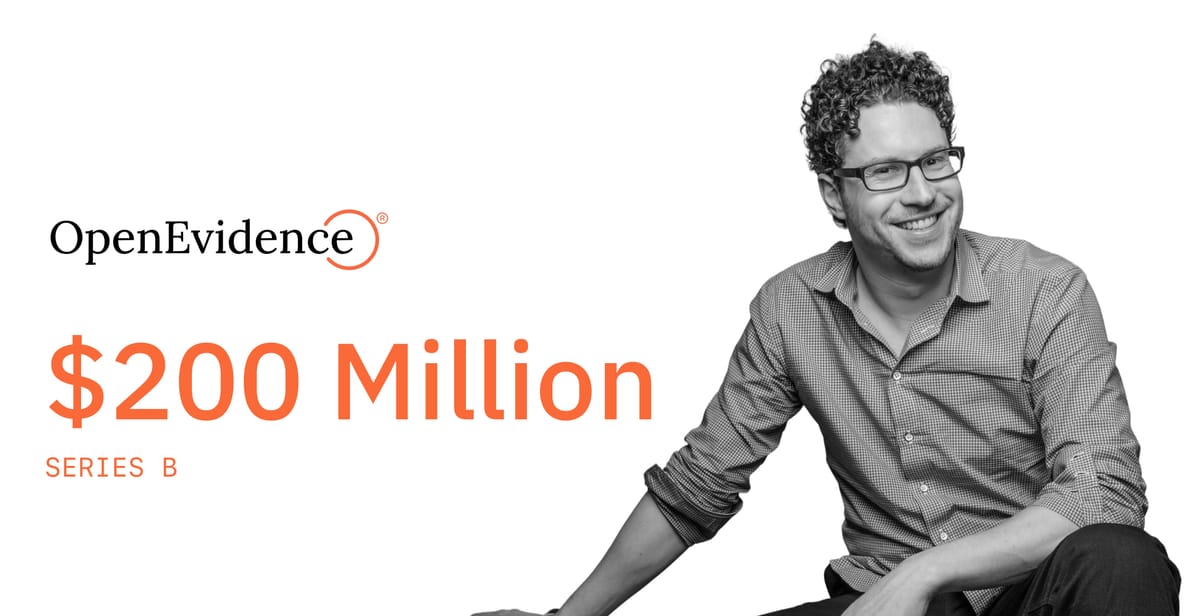
OpenEvidence—the medical AI assistant doctors compare to ChatGPT—plans to raise $200 million at a $6 billion valuation, according to the New York Times. It’s a near-doubling in three months for one of the fastest-growing healthcare apps, and a clear signal that the most valuable AI companies may be specialized, not general purpose.
Key Points
- $200M at $6B target valuation; prior $210M at $3.5B in July.
- Free for verified clinicians; trained on NEJM/JAMA via content partnerships.
- Ads-supported model is fueling rapid adoption across >10k medical centers.
If you’ve wondered when AI would move beyond flashy demos into tools doctors actually use, OpenEvidence is a case study. The company is reportedly finalizing a $200 million round at a $6 billion valuation, after raising $210 million at $3.5 billion in July. That pace—nearly doubling valuation in a quarter—puts it in rare company among healthcare startups.
OpenEvidence is free for verified U.S. clinicians and underwritten by advertising—a controversial choice in healthcare, but one that’s undeniably effective at distribution. The company says it’s in more than 10,000 hospitals and medical centers, adding roughly 60–70k clinicians per month, and handling millions of monthly consultations in-app.
The content moat matters, too. Instead of scraping the web, OpenEvidence secured rights to “blue-chip” sources—NEJM and JAMA—giving clinicians conversational answers grounded in peer-reviewed literature. In a market where hallucinations are a safety issue, provenance is product.
This is also a classic vertical-AI play. Rather than build another general model, OpenEvidence targets a specific, high-stakes workflow: point-of-care clinical decision support. That puts it up against incumbents like Wolters Kluwer’s UpToDate, long the default for evidence lookup. The CDSS market is sizable—roughly $6B globally in 2024 with steady double-digit growth—which helps explain why top-tier investors are piling in.
There’s momentum beyond the cap table. Jensen Huang recently called out OpenEvidence among the AI tools NVIDIA employees use—free marketing few startups enjoy. And the company has already climbed the funding ladder this year: a Sequoia-led round at a $1B valuation in February, then $210M at $3.5B in July, now aiming for $6B. The velocity mirrors what we’ve seen with other niche AI winners like coding assistant Cursor.
Still, adoption won’t be purely a function of capital or content. Clinician trust depends on reliability, clarity on when the model is uncertain, and fit with existing privacy and regulatory frameworks. On regulation: the FDA’s guidance on clinical decision support software gives leeway when tools help clinicians review information they can independently verify—precisely where evidence-grounded systems sit—but lines can blur as these assistants move from “search” into “recommendation” or autonomous agents. Vendors will need to continuously validate performance, disclose limitations, and watch for any shift that brings them under device oversight.
The monetization model is another watch-item. Ads in a clinician workflow raise obvious questions: who’s buying, how is targeting handled, and what safeguards prevent conflicts of interest? OpenEvidence’s approach appears to focus on medical-professional advertising (think: conferences, devices, journals), but scrutiny will rise with scale—especially if usage trends toward bedside contexts. (UpToDate, notably, relies on subscriptions rather than ads.)
Competition is heating up across adjacent lanes. UpToDate continues to modernize its CDSS suite; transcription/agent startups like Abridge, Suki, and Nuance dominate documentation; Hippocratic AI is pushing voice agents for patient interactions. The through-line: the next health-AI platform winner will be the one that embeds where clinicians already work, reduces cognitive load, and proves safety at scale.
For hospital leaders, the near-term calculus is straightforward: pilots with strict guardrails, procurement that tests against named clinical tasks, and governance that treats AI outputs like any consult—useful, but subject to clinician judgment. For OpenEvidence, the bar is even higher. If it can keep growing while preserving accuracy and clinician trust, a $6 billion valuation may not be the ceiling; if it stumbles on safety or incentives, brand equity could evaporate fast.

